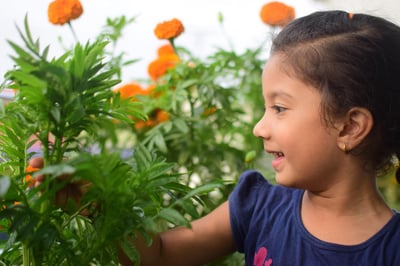Who's ready for summer? Break out the s'mores and flip flops as you jump into this time of leisure. Summer is also a time to find innovative ways to keep kids learning so that their knowledge stays sharp. In this blog post, Parent Ambassador Coordinator Darcie Lusk shares some tips on how to keep your summer fun, relaxing, yet educational!
There's nothing quite like the feeling of the end of the school year and the start of summer break.
It’s that wonderful feeling of relief as the pressures of the school year are put away for three beautiful months, and students and parents enjoy a more relaxing routine. While summer is a great time to relax, it’s also an opportunity to encourage students to be creative and continue using the skills they learned throughout the year. We’re here to give you some ideas for summer activities, as well as some tips on how to help your student unwind while still learning!

Tip 1: Proceed to the Route
Summer is prime time for travel, and we have probably all heard those instructions from our GPS as we venture to new places, but it is also great advice to keep in mind for summer learning.
Whether you are traveling across town or across the country, take advantage of every opportunity to incorporate educational experiences into your away-from-home adventures.
Traveling near or far allows for…
- Problem solving practice
- Map out a route to teach map skills, navigation, cardinal directions, and estimated time of arrival.
- For longer trips, create a travel budget that considers fuel, tolls, food, lodging, and any other travel expenses. Have your students brainstorm ways to save money on the trip.
- Health and safety reminders
- Teach car travel safety for drivers and passengers.
- Review safety practices when sight-seeing and touring new places.
- Reading and writing connections
- Keep a travel log and highlight favorite (and not-so-favorite!) places along the way.
- Listen to audio books. Consider listening to books your children may have to read for the upcoming school year to provide time for discussion about plot, characters, and themes.
- Historical and geographical interest
- Research the area or place you will be visiting ahead of time. Are there different foods, climates, customs, or traditions you may experience while there?
- Allow some wiggle room in the schedule to sight-see, appreciate scenery, or visit historic landmarks, even if you are “traveling” close to home.
Tip #2: Participate in PA Virtual's FREE Summer Camp
In addition to having time for creative projects, the arrival of summer also means it’s time for summer camps! Day camps, overnight camps, sports camps, STEM camps, and music camps are just a few in the vast variety of summer camps available to families. Kids’ summer options can seem like the perfect option for summer fun and learning, but attendance costs can add up quickly.

For a summer camp experience without the price tag, families can sign up for PA Virtual’s FREE Summer Camp. PA Virtual Summer Camp occurs weekdays at 11:00 a.m. from June 21 through July 15, and is open to all children! Summer Camp provides an array of offerings — from cooking, to art projects, to science-related activities — to include a variety of interests.
Take advantage of free lessons, tours, and experiences all summer long with your friends at PA Virtual Charter School for information, instruction, and inspiration to learn more!
Tip 3: Plan Projects
Projects are a great way to balance summer leisure and summer learning. Helping your children choose a few larger projects to work on during the course of the summer gives them purpose, focus, and a great sense of accomplishment. Not to mention that projects capitalize on children’s creativity!
Here are a few tips for planning summer projects with your kids:
- Kids won’t take to every summer project you suggest. Try to include your children in the brainstorming and planning stages so that the projects are more likely to interest them.
- Keep the projects relatively inexpensive just in case they aren’t a big hit. None of us want to invest a lot of money in something that doesn’t end up capturing our children’s interest.
- Repeat the projects that work really well from summer to summer. Chances are, these will allow for more depth and complexity as your children mature and develop.
Plan to do projects outdoors as much as possible. Being outside not only has huge health benefits, but also can allow for the space, movement, or mess that a project may require.

Here are a few summer ideas to get you started:
- Grow some vegetables: Whether you plant a garden or grow a few tomatoes in a pot, planting, nurturing, and harvesting vegetables can be a satisfying and rewarding experience for kids of all ages. Incorporating the food the children have grown into family meals expands the project’s significance.
- Make a TV series: Do your kids love to video? Perhaps interest them with the idea of making their own TV series over the summer. Have a “premiere” showing in August and invite family and friends to watch with you!
- Build things: Use whatever medium is appropriate for your child’s age – wood, cardboard, blocks, or repurposed containers. Try birdhouses, treasure boxes, stools, shelves, small bookcases, or even small pieces of furniture. Find a friend or relative that is good with construction and see if they would like to join in your project.
- Start a micro-business: This idea works well for older children. Help your young teens develop a business idea and business plan. Perhaps even launch the business at some point. Older kids usually love the idea of making money, and it is a great learning experience!
- Play with science: Summer is the perfect time to learn about nature, weather, motion, and more! Try some simple outdoor science projects and journal how much you learn.
- Create a Backyard Nature Guide Book: Work with your children to create a backyard nature field guide! Families can begin this project over the summer and continue it across all the seasons to make a complete and personalized nature book. Not only will you learn a lot about nature, your family will enjoy plenty of outside time together!
- Start the 1,000 Hours Outside Challenge: Learn about the benefits of spending more time outside and how your family can incorporate time outdoors as part of your lifestyle.
Tip #4: Practice School Skills in New Ways
Although we know that the learning our kids do at summer camps is a healthy, relaxing change from school year academics, we really don’t want our students to be behind when the new school year starts in the fall. How can we preserve the skills that they worked so hard on all year while keeping the summer stress-free?
When it comes to summer learning, the same approach doesn’t work for every family. Some families may find it beneficial to include some formal academic practice, but others might prefer to disguise the learning into fun activities that are incorporated throughout the day. Whatever the approach, three academic areas to include over the summer are reading, writing, and problem solving.

Reading
Kids Health encourages families to create intentional opportunities for summer reading so that kids can maintain the reading skills they worked so hard on all year long.
To encourage summer reading, they suggest that families
- maintain a reading schedule,
- visit the library often, and
- read on the go.
For older readers, the freedom of choosing books and reading without the pressure of assignments can be all it takes to maintain an interest in summer reading.
Writing
Another area that is important to maintain over the summer is writing. While regular writing prompts are an effective summer practice strategy, students can also maintain writing skills in other ways.
- Become pen pals with a family member that lives in another town or state and see how many letters can be exchanged over the course of the summer.
- Keep a journal.
- Write movie and book reviews for family members highlighting favorite summer reads or movies.
Incorporating writing into real life situations is not only effective practice, but naturally lends meaning to the writing.
Problem Solving
Of course, we all want to help our students maintain those precious problem-solving math skills over the summer, too! While families may find it valuable to include math practice using fact drills, they may also want to incorporate math practice into daily activities.
Consider the following ideas for real-life math practice:
- Baking and Cooking: Have your student practice doubling, tripling, or reducing recipes for fraction practice. Increasing or reducing recipes is also a way of practicing measurement conversions.
- Checking Account: Use a sample check register to have your student keep a pretend checking account. Use play money to have students "deposit" and "withdraw" and keep track of their balance. For more advanced practice, have them pretend to take out a loan and repay it with interest.
- Board Games or Card Games: Games are also a super way to "sneak" in extra math practice. Make your student the official scorekeeper or banker for the game. There are many card games and dice games that are fun, inexpensive ways to maintain math skills, too.
So, whether our approach is formal or informal, or a mixture of the two, let’s spend some of our time this summer maintaining our students’ hard earned academic skills and avoid that “summer slide!”
 About the Author: Darcie Lusk is the Parent Ambassador Regional Coordinator for families in Western Pennsylvania.
About the Author: Darcie Lusk is the Parent Ambassador Regional Coordinator for families in Western Pennsylvania.
Photo credits to:
Mi Pham on Unsplash; and tekhnika, yohoprashant, Vic_B on Pixabay.





Comments